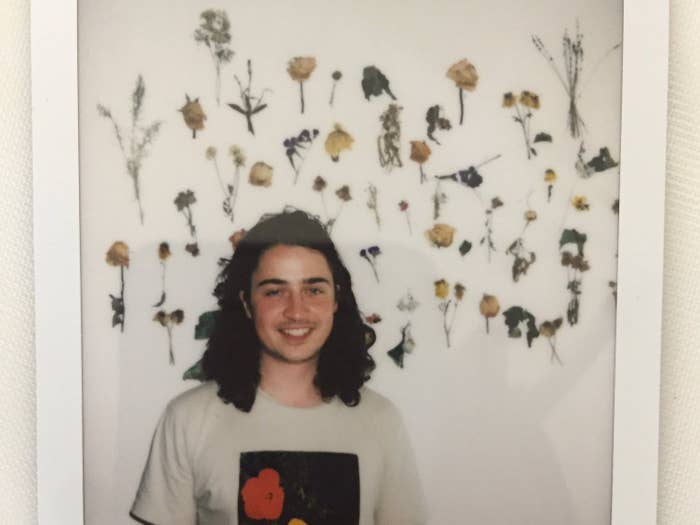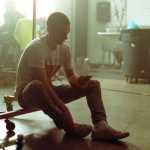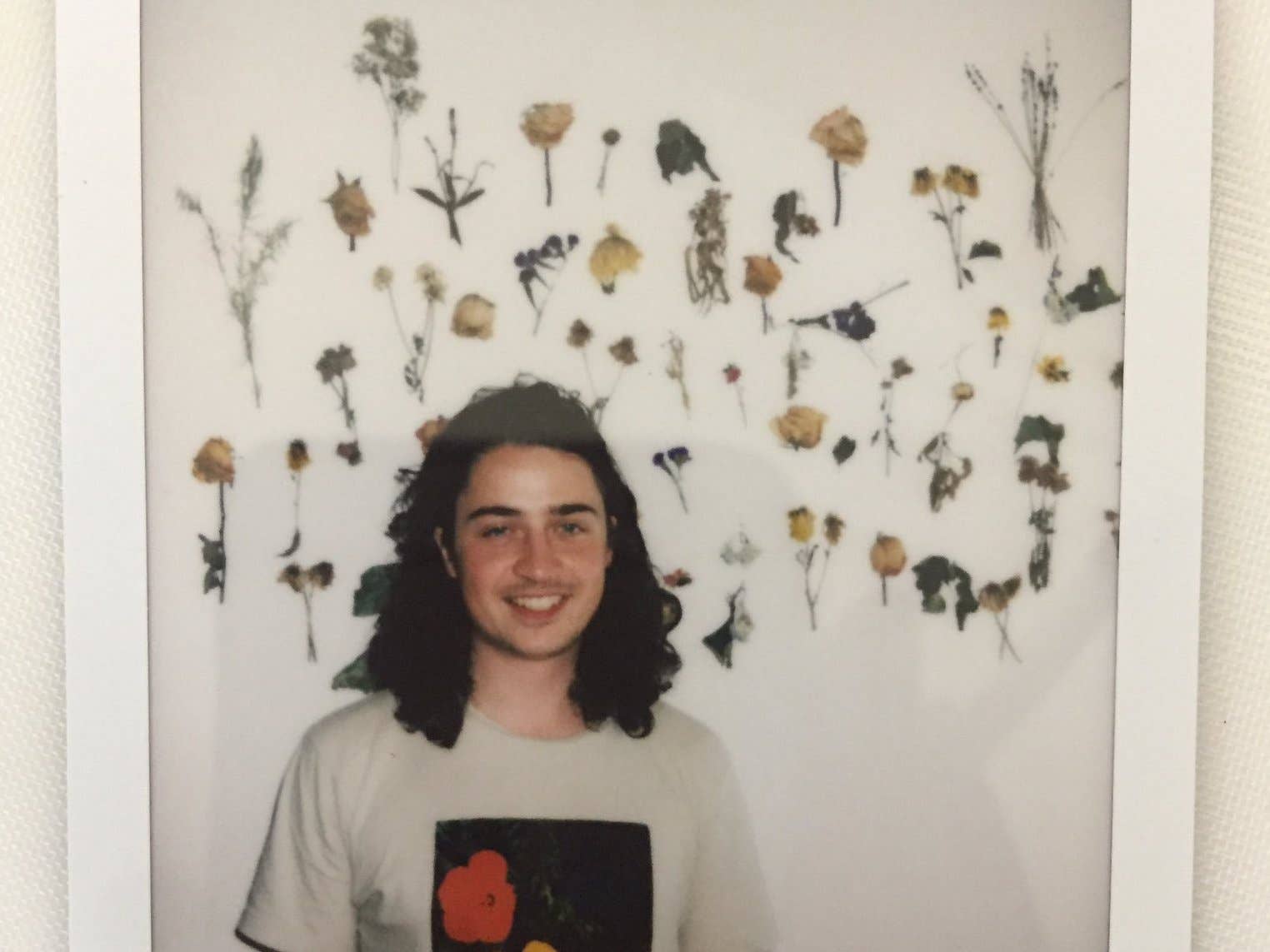
Of the many Chicago creatives finding mainstream success in recent years, Knox Fortune is an anomaly. He's not a rapper, he doesn't make R&B, and his music doesn't owe any overt debts to city legends like Kanye or Common—Knox Fortune is a songwriter, a singer first, and until today's release of his debut album Paradise, part of the glue that held together the city's diverse soundscape. Now he's one of its centerpieces.
Paradise lives up to its name, a lighthearted, breezy collection of songs Knox describes as "off-kilter hits." But for all its playfulness, this is an album with depth—the Joey Purp collaboration "Stun" and album closer "Spill" has Knox approaching melancholy, hazy territory occupied by the likes of Toro y Moi and Gorillaz.
But as his work with Chance the Rapper demonstrated, Knox knows his way around a poppy hook. And he's getting looks from all the right people, recently spending three weeks at Rick Rubin's Shangri-La studios. Knox's musical range is increasing by the day, and we got on the phone with the Chicago native to hear how it all happened.
How long were you recording the album? When did you decide to make a Knox Fortune solo album?
I had a lot of different ideas about how I would eventually put it out… I was thinking about a series of EPs, but I like whole projects, especially for debuts. When an artist comes out with a debut EP, it feels a little incomplete.
After “All Night” came out, I was really driven towards the solo project. A lot of the songs were already in place, it was just a matter of making it something special.
What is it about these songs that got them on the album?
All of these songs are a kind of dirty pop. They have got an upbeat thing going, they’re all very genuine songs. I tried to stray away from sad, or darker songs for this particular project—I still make a ton of stuff like that, but this was just a bunch of off-kilter hits. Like “Lil Thing”—they’re not exactly something you’d hear on the radio, but they still have a mass appeal.
Did you shoot that video on film?
Yeah, Super 16. I shot that with my best friend Jackson James, and his friend Ryan Ohm. They did the “Girls @” videos, a lot of the Twin Peaks videos, and they’ve worked with Towkio. We shot it at my old crib, Chiller’s Paradise. It has since been torn down, I’m actually sitting next to one of my old roommates from Chiller’s Paradise currently.
How did you first get into music?
I used to take piano lessons, but I didn’t really enjoy them. When I was really young I used to go to Michigan every summer with my family, and I would sing this song about going to the beach. It was literally about how I wanted to go to the beach.
But there was a pretty long gap before I went back to thinking about songs all the time. It was probably when our family got the first Mac with Garageband. Right when Garageband came out, I was in sixth grade in a Virtual Studies class, and it started as a hobby from there.
Where did you record the album?
Most of it was at my crib, but I recorded a lot at Shangri-La, Rick Rubin’s studio. I was out there working with Towkio for an extensive period, a couple of times this year. We would live out there for a few weeks at a time, and sometimes I would have free time and write some songs. Also Private Stock Studios in Chicago, I recorded a lot of vocals there.
Most of it was preconceived in my house, by myself, and then I would take it to a real studio to bring in other people to work on production ideas or what have you.
Was Shangri-La the creative paradise we imagine it to be?
Absolutely. It’s beautiful every day. The course of your day is so nice, especially when you’re there for an extended period of time. There’s no huge rush—there’s kind of a rush, but when you have three weeks there, the end isn’t in sight at the beginning.
We had a big crew out there—the coolest part about Shangri-La is that there’s production staff there all the time, and every room of the house can be turned into a studio. You can go up to someone who works there and say, “Yo, I need you to set up two amps in the main barn room, and we’re gonna send the signals through these mics,” and they’ll set it up for you. You just gotta have the idea.
WE'VE JUST GOTTEN BETTER. IT WENT FROM A HOBBY, TO A PASSION, TO A PROFESSION—FOR EVERYBODY.
You were the executive producer for Joey’s album iiidrops, how did that role compare to making your own album?
With my project, there’s no compromising. For someone else's project, you have an executive authority, but so do they. I’m not going to force someone to do something they don’t want to do. If I feel strongly about something I’m going to highly encourage it, but I don’t even have that power when it’s someone else’s project.
You and Joey are a cornerstone of Chicago music at this point… how have you seen the city’s scene change in the last few years?
We’ve just gotten better. It went from a hobby, to a passion, to a profession—for everybody. Some of our friends have label deals, some of our friends have publishing deals. And as far as this album goes, I’ve been getting a crazy response—I get stopped in the street all the time in Chicago now, and that wasn’t the case a year ago. I just think artists like Chance, Whitney, Joey, Vic, Towkio, and Kami… everybody cares about music in Chicago now, they love music so much.
Is there anything you didn’t expect about being a solo artist that you’ve experienced in the last couple of months?
I didn’t know I had the support that I did until I started putting out music. So many people came up to me and said, “I’m dying to hear your project,” people I looked up to. And I was like, “Really?”
After “Torture” came out, that’s when it really became people from random parts of my life texting me.
I wanted to ask about your vocals, because most people might know you better as a producer. “All Night” was the first time I heard you singing, and it’s a huge part of the album. Is singing something you consciously learned and practiced, or has your voice always just been another instrument?
It’s another instrument, it’s probably my best instrument. It’s easiest for me to just smack out an idea with vocals. Easier than a piano or anything, it just comes to me as a vocal. I also record alone, which I think has a lot to do with that. Sometimes I can get self-conscious if there’s an engineer in the room, but if I hear something by myself and know it’s hot, that’s it.
I feel like most people are accustomed to working with an engineer. But I went to school for engineering, I’ve engineered my own vocals for eight years or so, and that’s just how I do it. I don’t mind it as much anymore, but I still prefer to just clear the studio and be in there by myself. Random people, random engineers, whoever, I do not like them in the room.
Who else made it on the album?
I tried really hard to have no features, but there’s one song I have with Joey. It’s pretty old, and I just didn’t see him putting it out because it’s more so my vibe, so I decided to adopt it. I have a song with Kami on my project, and then the rest of the features are just producers. I’m producing all the songs, but I had people come in and do session work. Nico Segal came in on “Lil Thing,” Cam O’bi on “Help Myself,” Carter Lang on a lot of the project, Lido worked on two songs. I made a lot of stuff with Lido at Shangri-La, and he’s crazy. He’s a true Norwegian pop star. We wrote a bunch of songs for other artists at Shangri-La, just as warm-up, three of them were so sick. They’ll probably never see the light of day.
Stream Knox Fortune's Paradise below.

